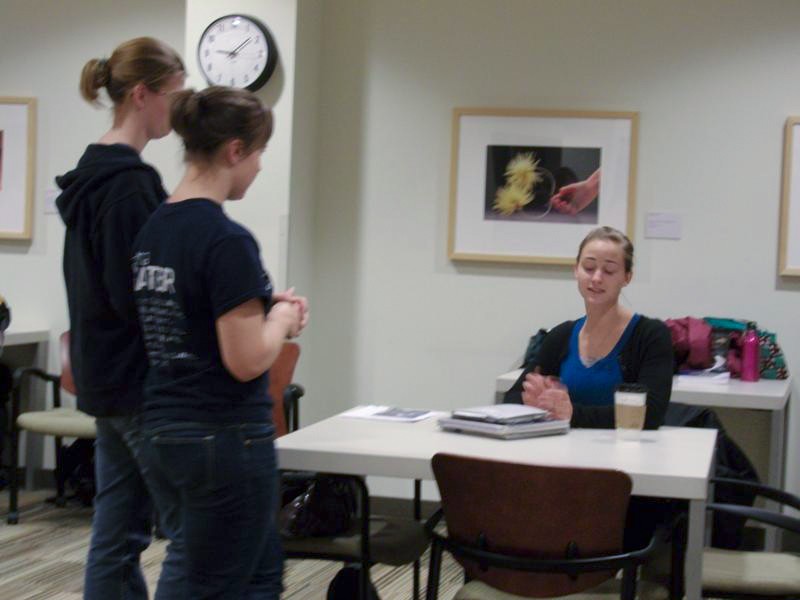Act on Racism helps students ask right questions

Members of AoR perform the skit “Roomates” durng the Cultural Awareness Event
Oct 24, 2010
It is the 21st century. The U.S. has a bi-racial president, and diversity is a main part of many universities, communities and organizations. But racism is still a topic of discussion.
Act on Racism with the Niemeyer Living Center held a program on Oct. 18 called “Asking the Right Questions: Cultural Awareness.” The program discussed how to communicate respectfully in matters of ethnic background and fighting racism.
“We were trying to set up programs that would address the needs of the community and bring diversity,” said Andrea Blanchard, a resident assistant at Niemeyer Living Center. “We thought Act on Racism would be great way to accomplish that.”
Blanchard said she hopes students learned stereotypes do not have a solid foundation and know how to address racism.
AoR performed five skits: “Roommates” discussed discrimination in the matters of space, “Where are you from?” showed stereotypes and preconceived notions, “Politics of Hair” shined a light on black women and institutional racism, “The 50” was a silent representation of discriminatory behavior on the bus system and “Laptop” challenged misconceptions based on race.
In “Laptop,” two white students talked about a new laptop received by black student across the hall. One student claims it is because she was black. The other student appears uncomfortable but does not stop the friend from saying racist remarks.
The students in attendance agreed it takes courage to ask and find out why a friend or family member thinks in a certain way.
“Ninety-nine percent of people take criticism badly, but that doesn’t mean you didn’t have an impact,” said Brianna Middlewood, an AoR member. “All of us are a little bit racist. Our brains are programmed to categorize and we’re going to make judgments based on appearances, but it’s up to us whether or not to act on those things.”
After the performances, the 13 members of AoR opened discussion with the 15 students in attendance. They broke down the message of all five skits and shared their opinions on stereotypes and racism. Students said basing judgments on people’s appearances shows ignorance.
“The idea of racism is that it is completely illogical, but because we believe it, it becomes logical,” said Omega Barton, AoR member.
Biomedical Science major Maria Edelhauser attended the program for a LIB 100 class, but she gained a new outlook when she left.
“Racism is all around us whether we realize it or not,” she said. “(It) depends on if you want to pick it up or realize it.”
AoR is a student performance group created in 2005 by Professor Jennifer Stewart. The group began with an assignment called “Acts of resistance” in which students shared stories of racism. Some stories were so good that Stewart wanted to make them into skits. Since 2005, the group has added more stories from students, AoR members, people from the community and faculty.
“As an individual, the idea of action, of being a person of change, the first step is standing up when you see an issue,” Barton said. “We understand you can’t do it all the time. Sometimes you will miss opportunities but try to get into the habit of being an activist. Help others be activists, help others to be the change.”
Phoebe James, an AoR member, said change begins with self-evaluation.
“I think that right there is the best change I can make in the world by making the change first in myself,” she said. “People around me notice that and they change the way they act because of the way I act. So doing something that seems so small can change so many people.”






















